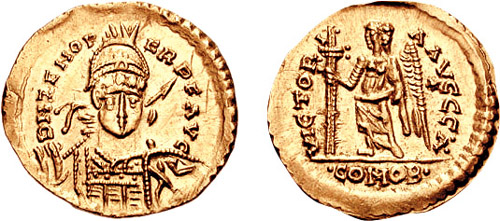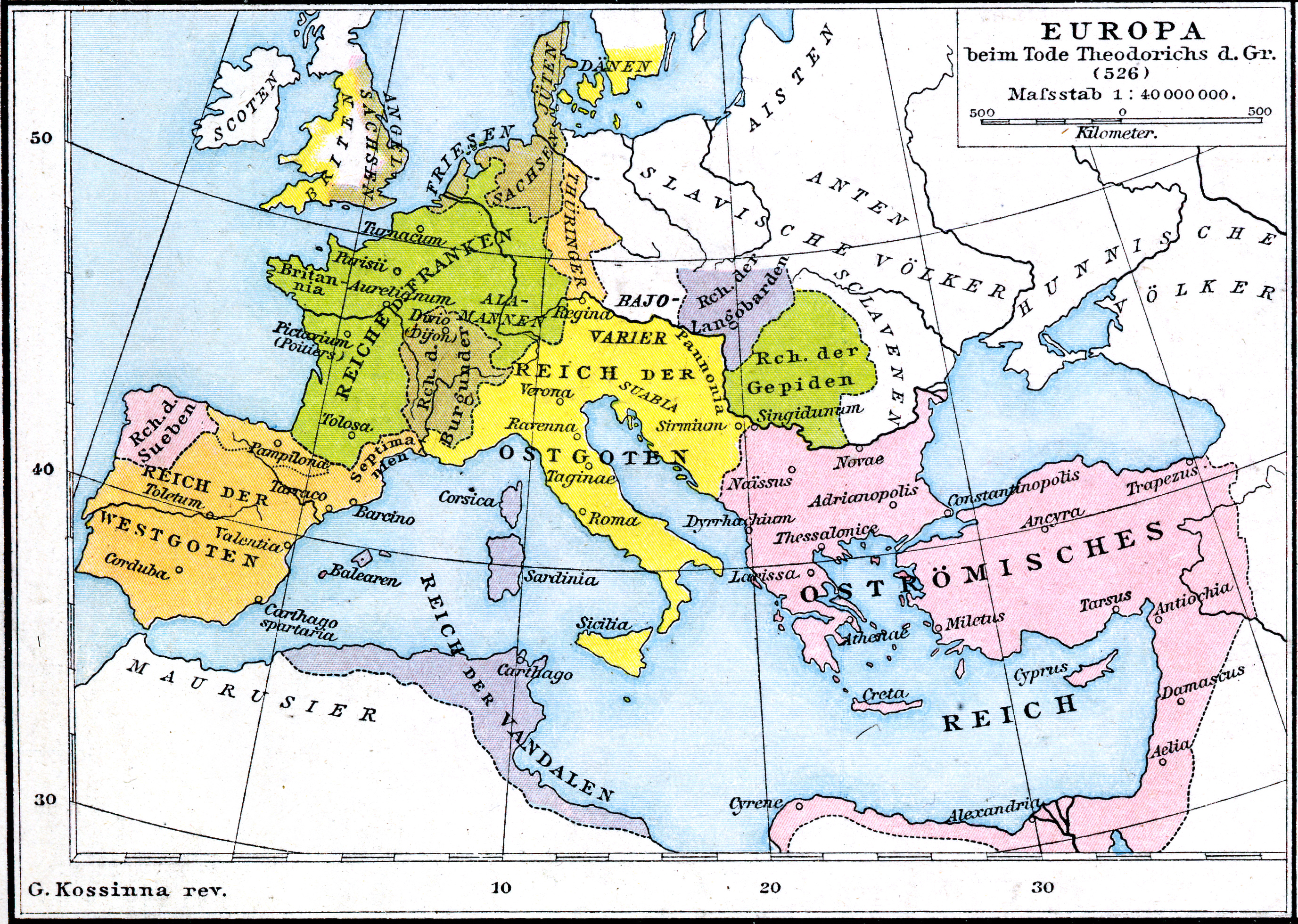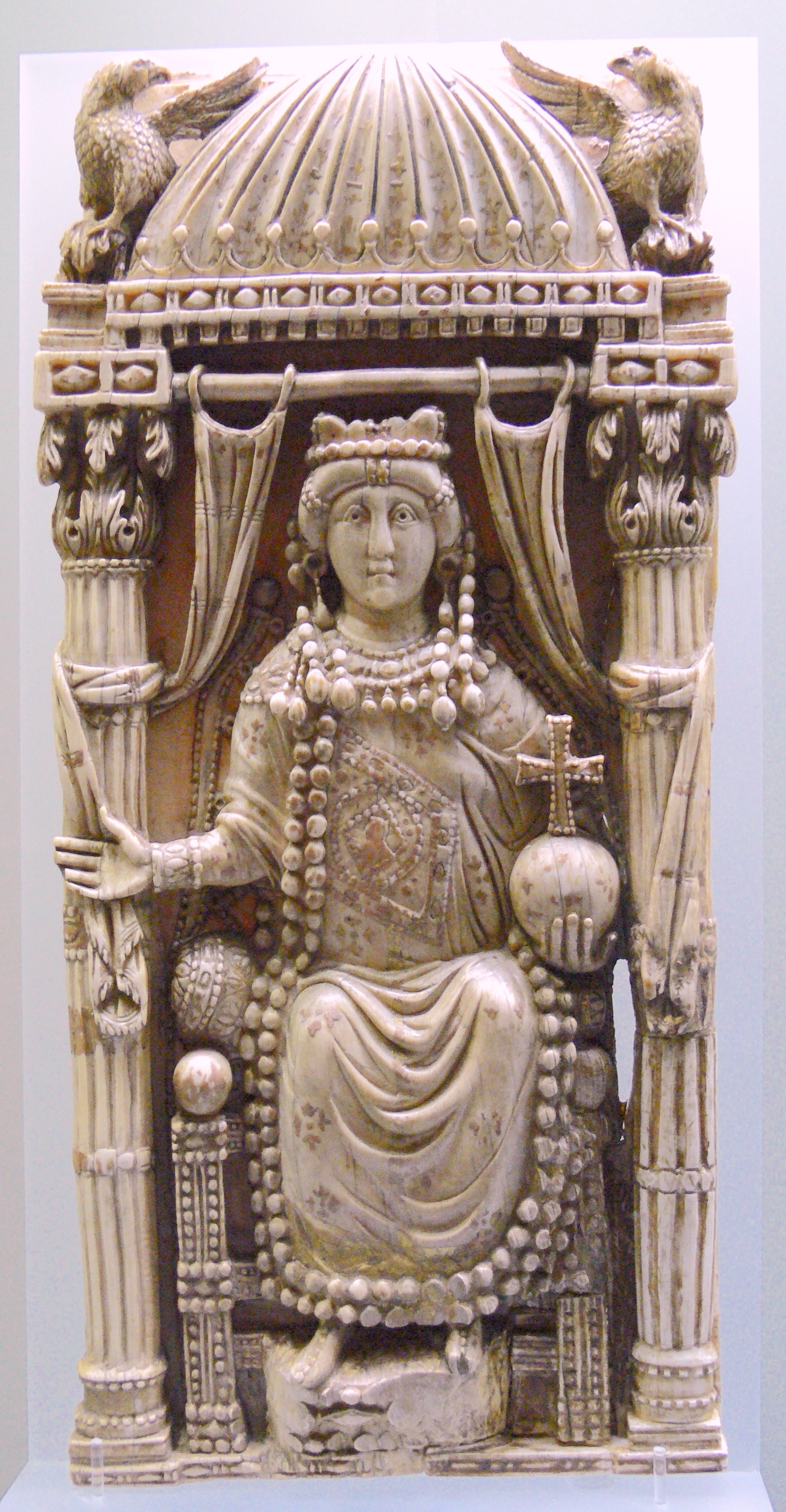|
Frideric
Frideric (; ? - 492/493) was the leader of the Germanic Rugians from 487 to 492/493. Life Frideric was a son of the Rugian king Feletheus. In late 487, Odoacer, the King of Italy, invaded the Rugian kingdom and destroyed it. Frideric's father and his mother, the Ostrogothic princess Gisa, were captured and executed in Italy. Frideric was able to escape and gather the remaining Rugian survivors. In 488 he attempted to reconquer their traditional kingdom, but was defeated by Odoacer's brother Hunulf. After attempts to recapture their territory failed, Frideric and his followers sought help from Theodoric the Great, king of the Ostrogoths, marching downstream along the Danube to Novae, near Svishtov, for the purpose. They encountered no opposition along the way, which implies that the Eastern Roman Empire may have arranged everything in beforehand. In 489, shortly after the arrival of Frideric, Theodoric was appointed ruler of Italy by the Eastern Roman emperor Zeno. After ... [...More Info...] [...Related Items...] OR: [Wikipedia] [Google] [Baidu] |
Tufa (general)
Tufa (? - 492/493) was a Germanic warrior active in 5th century Italy. Life The name Tufa is East Germanic, and it is possible that he was Rugian. He was a follower of the Germanic warrior Odoacer, who in 476 proclaimed himself King of Italy. Tufa was the commander-in-chief of the army of Odoacer's Kingdom of Italy when the Ostrogothic king Theodoric the Great invaded the country in 489. Tufa quickly deserted to Theodoric, along with large numbers of Odoacer's army. Tufa acquired Theodoric's confidence, and was dispatched to Ravenna with a band of elite troops in the hope that the city would surrender to Theodoric without battle. Upon arrival in Ravenna however, Tufa again changed sides, and the elite Gothic soldiers entrusted to him were killed. This was considered Theodoric's first defeat in Italy. In 490, after Odoacer had been defeated in battle by Theodoric and retreated to Ravenna, Tufa held his ground in the strategically important valley of Adige near Trento. In the fal ... [...More Info...] [...Related Items...] OR: [Wikipedia] [Google] [Baidu] |
Feletheus
Feletheus (also known as Feva, Feba, Foeba, Fevva, Fevvanus, Theuvanus; died 487) was the king of the Rugii from 475 to 487. Biography Feletheus was the son of Flaccitheus, king of the Rugii and founder of the Kingdom of the Rugii. His brother was Ferderuchus. Feletheus was married to the Goth Gisa, who was probably the cousin of the Amal Ostrogothic king Theodoric the Great. After the death of his father, probably in 475, Feletheus succeeded his father as king of the Rugii. Their territory at the time was based in Lower Austria. In 476, Feletheus supported Odoacer and his Scirian and Herulian allies in the overthrow of the Roman Emperor Romulus Augustus. Feletheus was a close confidant of Severinus of Noricum. After the Eastern Roman Emperor Zeno attempted to create conflict between the Rugii and Odoacer, Feletheus executed his nephew Fredericus, who supported Odoacer. Odoacer subsequently invaded the Kingdom of the Rugii, utterly defeating them at a battle near present- ... [...More Info...] [...Related Items...] OR: [Wikipedia] [Google] [Baidu] |
Odoacer
Odoacer ( – 15 March 493 AD), also spelled Odovacer or Odovacar, was a barbarian soldier and statesman from the Middle Danube who deposed the Western Roman child emperor Romulus Augustulus and became the ruler of Italy (476–493). Odoacer's overthrow of Romulus Augustulus is traditionally understood as marking the end of the Western Roman Empire. Although he held power over Italy, he also represented himself as the client of the Eastern Roman Emperor in Constantinople, Zeno. He was referred to not only as a king (), but also as commander (), or using the Roman honorific patrician, granted by Zeno. Odoacer himself used the title of king in the only surviving official document that emanated from his chancery, and it was also used by the consul Basilius. He had the support of the Roman Senate and was able to distribute land to his followers without much opposition. Unrest among his soldiers led to violence in 477–478, but no such disturbances occurred during the later p ... [...More Info...] [...Related Items...] OR: [Wikipedia] [Google] [Baidu] |
Rugiland
The Kingdom of the Rugii or Rugiland was established by the Germanic Rugii in present-day Austria in the 5th century. History Background The Rugii were an East Germanic tribe who probably migrated from southwest Norway to Pomerania in the 1st century. In the beginning of the 4th century, the Rugii moved southwards and settled at the upper Tisza in ancient Pannonia, in what is now modern Hungary. They were later attacked by the Huns, and they fought alongside Attila at the Battle of the Catalunian Plains in 451. In 453, they successfully rebelled against the Huns along with other Germanic tribes at the Battle of Nedao, after which they settled in the counties of Waldviertel and Weinviertel which lie north of the Danube. Nowadays these counties are part of Lower Austria but were never part of the Roman province of Noricum. Kingdom By 467, the Rugii ruled a kingdom based in Lower Austria under their king Flaccitheus. After his death in 475, Flaccitheus was succeeded by his son ... [...More Info...] [...Related Items...] OR: [Wikipedia] [Google] [Baidu] |
Ostrogoths
The Ostrogoths () were a Roman-era Germanic peoples, Germanic people. In the 5th century, they followed the Visigoths in creating one of the two great Goths, Gothic kingdoms within the Western Roman Empire, drawing upon the large Gothic populations who had settled in the Balkans in the 4th century. While the Visigoths had formed under the leadership of Alaric I, the new Ostrogothic political entity which came to rule Italy was formed in the Balkans under Theodoric the Great. Theoderic's family, the Amal dynasty, accumulated royal power in Roman Pannonia after the death of Attila, and collapse of his Hunnic empire. Byzantine Empire, Byzantine Zeno (emperor), Emperor Zeno played these Pannonian Goths off against the Thracian Goths to their south. However, instead the two groups united after the death of the Thracian leader Theoderic Strabo and his son Recitach. Zeno then backed Theodoric to invade Italy and replace Odoacer there, whom he had previously supported as its king. In 493, ... [...More Info...] [...Related Items...] OR: [Wikipedia] [Google] [Baidu] |
Onoulphus
Onoulphus, also Onoulf, Unulf and Hunulf (died 493) was a general of the late fifth century of Scirian origin. He served as '' magister militum per Illyricum'' from 477 to 479 as a general of the Eastern Roman Empire, then afterwards was a general for his brother Odoacer, king of Italy, until their death. Biography Onoulphus was a Scirian; with his brother (or possibly half-brother), Odoacer, he was raised at the court of Attila, King of the Huns. Following the destruction of the Sciri, who had been incited to break their treaty with the Ostrogoths by Hunimund, king of the Suebi, Onoulphus with his father Edeko joined the Suebi side in the Battle of Bolia in the late 460s, where they were again defeated by the Ostrogoths under their king Theodemir. Onoulphus joined the Roman army in the 470s and rose through its ranks. He found a protector in the general Armatus, who had him appointed first ''comes'' and in 477, '' magister militum per Illyricum'', commander in chief of the ... [...More Info...] [...Related Items...] OR: [Wikipedia] [Google] [Baidu] |
Theodoric The Great
Theodoric (or Theoderic) the Great (454 – 30 August 526), also called Theodoric the Amal, was king of the Ostrogoths (475–526), and ruler of the independent Ostrogothic Kingdom of Italy between 493 and 526, regent of the Visigoths (511–526), and a patrician (ancient Rome)#Late Roman and Byzantine period, patrician of the Byzantine Empire#Loss of the Western Roman Empire, Eastern Roman Empire. As ruler of the combined Gothic realms, Theodoric controlled an empire stretching from the Atlantic Ocean to the Adriatic Sea. Though Theodoric himself only used the title 'king' (''rex''), some scholars characterize him as a Roman Emperor#Later assertions to the title, Western Roman emperor in all but name, since he ruled a large part of the former Western Roman Empire described as a ''Res Publica'', had received the former Western imperial regalia from Constantinople in 497 which he used, was referred to by the imperial title ''princeps'' by the Italian aristocracy and exercised imper ... [...More Info...] [...Related Items...] OR: [Wikipedia] [Google] [Baidu] |
Germanic Peoples
The Germanic peoples were tribal groups who lived in Northern Europe in Classical antiquity and the Early Middle Ages. In modern scholarship, they typically include not only the Roman-era ''Germani'' who lived in both ''Germania'' and parts of the Roman Empire, but also all Germanic speaking peoples from this era, irrespective of where they lived, most notably the Goths. Another term, ancient Germans, is considered problematic by many scholars since it suggests identity with present-day Germans. Although the first Roman descriptions of ''Germani'' involved tribes west of the Rhine, their homeland of ''Germania'' was portrayed as stretching east of the Rhine, to southern Scandinavia and the Vistula in the east, and to the upper Danube in the south. Other Germanic speakers, such as the Bastarnae and Goths, lived further east in what is now Moldova and Ukraine. The term ''Germani ''is generally only used to refer to historical peoples from the 1st to 4th centuries CE. Different ac ... [...More Info...] [...Related Items...] OR: [Wikipedia] [Google] [Baidu] |
Zeno (emperor)
Zeno (; ; – 9 April 491) was Eastern Roman emperor from 474 to 475 and again from 476 to 491. His reign was plagued by domestic revolts and religious dissension, but was more successful on the foreign front. He is credited with further stabilizing the Eastern empire, while the Western Roman Empire fell following the deposition of Romulus Augustulus. Born in Isauria, Zeno was known as Tarasis before adopting his Greek name and becoming an ally of Emperor Leo I (emperor), Leo I, who saw the Isaurian general as an important counterweight against the Germanic leader Aspar. In 466, he married Leo I's daughter, Ariadne (empress), Ariadne, with whom he had a son, Leo II (emperor), Leo. On the death of Leo I in 474, Zeno's seven-year-old son took the throne as Leo II, with Zeno made co-emperor shortly after. Leo II died of an illness later that year, leaving Zeno as the sole emperor. Despite his early success in making peace with the Vandals, Zeno was an unpopular emperor due to his ... [...More Info...] [...Related Items...] OR: [Wikipedia] [Google] [Baidu] |
Early Germanic Warriors
Early may refer to: Places in the United States * Early, Iowa, a city * Early, Texas, a city * Early Branch, a stream in Missouri * Early County, Georgia * Fort Early, Georgia, an early 19th century fort Music * Early B, stage name of Jamaican dancehall and reggae deejay Earlando Arrington Neil (1957–1994) * Early James, stage name of American singer-songwriter Fredrick Mullis Jr. (born 1993) * ''Early'' (Scritti Politti album), 2005 * ''Early'' (A Certain Ratio album), 2002 * Early Records, a record label Other uses * Early (name), a list of people and fictional characters with the given name or surname * Early effect, an effect in transistor physics * Early, a synonym for ''hotter'' in stellar classification In astronomy, stellar classification is the classification of stars based on their stellar spectrum, spectral characteristics. Electromagnetic radiation from the star is analyzed by splitting it with a Prism (optics), prism or diffraction gratin ... See also * * ... [...More Info...] [...Related Items...] OR: [Wikipedia] [Google] [Baidu] |
5th-century Germanic People
The 5th century is the time period from AD 401 (represented by the Roman numerals CDI) through AD 500 (D) in accordance with the Julian calendar. The 5th century is noted for being a period of migration and political instability throughout Eurasia. It saw the collapse of the Western Roman Empire, which came to a formal end in 476 AD. This empire had been ruled by a succession of weak emperors, with the real political might being increasingly concentrated among military leaders. Internal instability allowed a Visigoth army to reach and ransack Rome in 410. Some recovery took place during the following decades, but the Western Empire received another serious blow when a second foreign group, the Vandals, occupied Carthage, capital of an extremely important province in Africa. Attempts to retake the province were interrupted by the invasion of the Huns under Attila. After Attila's defeat, both Eastern and Western empires joined forces for a final assault on Vandal North Africa, but ... [...More Info...] [...Related Items...] OR: [Wikipedia] [Google] [Baidu] |
University Of California Press
The University of California Press, otherwise known as UC Press, is a publishing house associated with the University of California that engages in academic publishing. It was founded in 1893 to publish scholarly and scientific works by faculty of the University of California, established 25 years earlier in 1868. As the publishing arm of the University of California system, the press publishes over 250 new books and almost four dozen multi-issue journals annually, in the humanities, social sciences, and natural sciences, and maintains approximately 4,000 book titles in print. It is also the digital publisher of Collabra and Luminos open access (OA) initiatives. The press has its administrative office in downtown Oakland, California, an editorial branch office in Los Angeles, and a sales office in New York City, New York, and distributes through marketing offices in Great Britain, Asia, Australia, and Latin America. A Board consisting of senior officers of the University of Cali ... [...More Info...] [...Related Items...] OR: [Wikipedia] [Google] [Baidu] |





